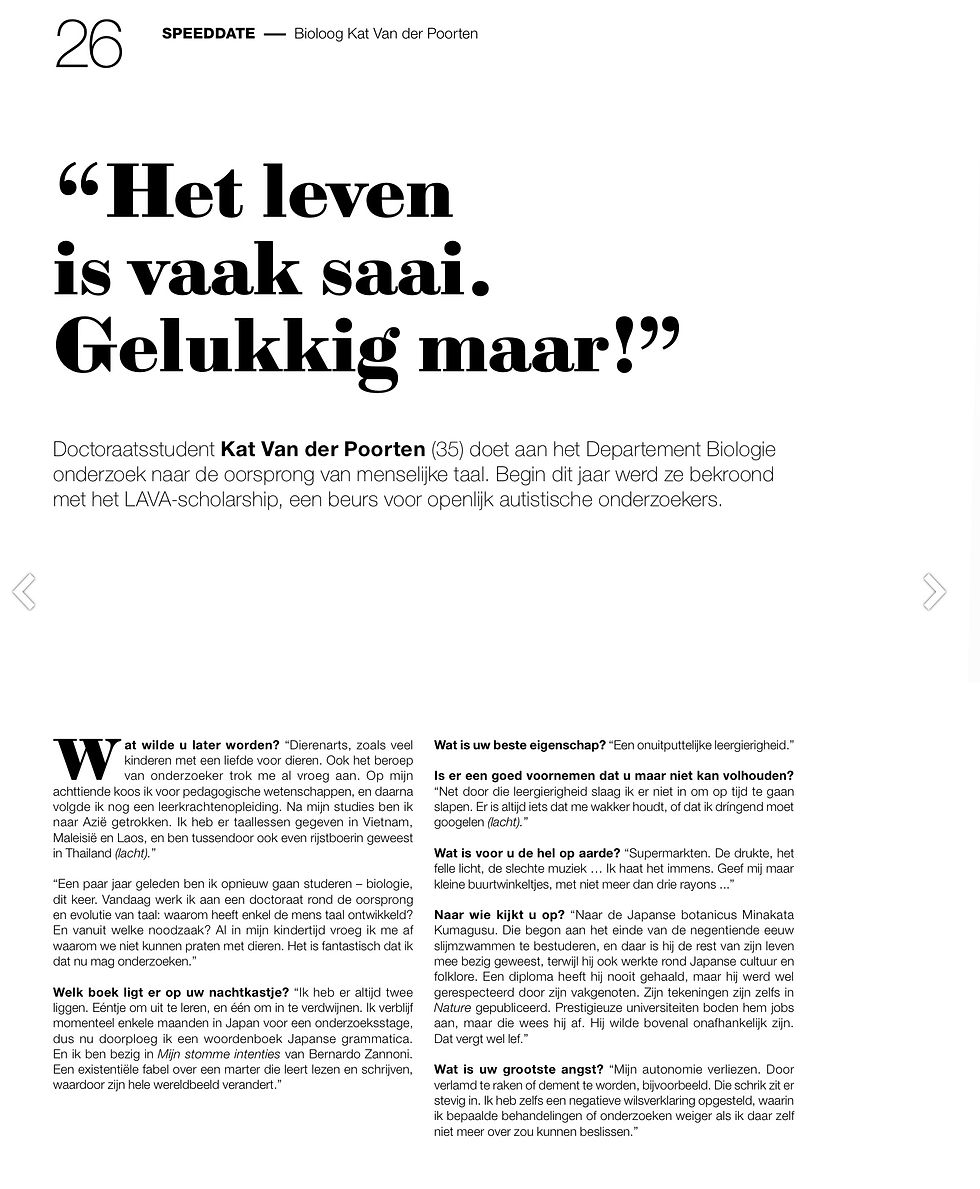Filosofische Perspectieven op Neurodiversiteit
- 9 jan 2020
- 4 minuten om te lezen
We houden je op deze pagina op de hoogte van een nieuwe datum (waarschijnlijk ergens in September 2020).
LAVA organiseert samen met ’t Autism Ethics Network een studiedag op 16/3/20 (details, zie “verder lezen”).
Volwassenen met autisme zijn uiteraard erg welkom dus aarzel niet om dit te delen in je fysieke en virtuele netwerk. De voertaal zal dit keer wel het Engels zijn.
Als jullie er niet bij kunnen zijn maar vragen hebben m.b.t. onderstaande topics, kunnen jullie deze in de comments achterlaten. We doen ons best om dit aan bod te laten komen tijdens de discussie.
16/03/2020: Philosophical Perspectives on Neurodiversity (University of Antwerp) (This event will be conducted in English)
This study day is co-organized by the Flemish Reading & Advise Group Adults with Autism (Lees- en Adviesgroep Volwassenen met Autisme – LAVA). It is financially supported by the Flemish Fund for Scientific Research (Fonds Wetenschappelijk Onderzoek van Vlaanderen -FWO).
Janna Van Grunsven, Perceiving ‘Other’ Minds – Autism, 4E Cognition, and The Idea of Neurodiversity. Robert Chapman, Is Neurodiversity a Valid Concept? Jo Bervoets, Neurogradualism: Neurodiversity without Categorical Difference.
The study day takes place from 13:30 to 17:30 in room D015 on Stadscampus Universiteit Antwerpen.
Attendance at the study day is free but registration is required (coffee will be provided), please mail to jo.bervoets@uantwerpen.be.
Short abstracts of presentations/Short biographies of the presenters:
Janna Van Grunsven (Technische Universiteit Delft): Perceiving ‘Other’ Minds – Autism, 4E Cognition and The Idea of Neurodiversity.
Abstract: The neurodiversity movement has called for a re-thinking of autistic mindedness. It rejects the commonplace tendency to theorize autism by foregrounding a set of deficiencies in behavioral, cognitive, and affective areas. Instead, the idea is, our conception of autistic mindedness ought to foreground that autistic persons often experience the world in manners that can be immensely meaningful to themselves and to human society at large. In this paper I presuppose that the idea of neurodiversity is worth taking seriously and I explore to what extent it can be accommodated within a 4E cognition framework by scrutinizing two 4E approaches to autistic mindedness: Shaun Gallagher’s interactionism (2004 & 2008) and Hanne de Jaegher’s autopoietic enactivism (2013). Although these accounts share a number of theoretical commitments, they are also marked by different points of emphasis. Though seemingly innocuous, I show that these differences end up having a significant impact on how autistic mindedness is brought in view and how, correspondingly, the idea of neurodiversity can get a foothold.
Short bio: Janna van Grunsven is an assistant professor in TU Delft’s ethics and philosophy of technology section. Broadly, her work focuses on experiences related to human embodiment and social interaction and the ways in which these can be shaped and transformed through the use of different (clinical) technologies. She has written in particular on how different theoretical pictures and technological developments have decisive ethical implications for how persons on the autism spectrum are brought in view in a moral sense.
Robert Chapman (University Bristol): Is Neurodiversity a Valid Concept?
Abstract: In the philosophy of medicine mental dysfunction is typically framed through what I call individualist comparatavism. On this view, the functional capacities of each individual are compared to the average functional capacities across the species, meaning that health is defined as normal function and dysfunction is defined as sub-normality. By contrast, neurodiversity proponents argue that neurological diversity itself is normal, and that the orthodox framing underpins and reinforces a systematic undue pathologisation of minority mental functions. Critics of the neurodiversity have dismissed the concept on the grounds that it is an activist-developed political concept that is not scientifically valid. Against this I argue that the neurodiversity analysis of mental functions fits better fits with current directions in medical and psychological theory and practice. Moreover, I show provide evidence to show that neurodiversity as a group property, and minority niche traits, can contribute to functional group effects even when the same traits are individually disabling. This establishes neurodiversity as a valid alternative to individualist comparativist models, and has important ethical and practical implications.
Short bio: Robert Chapman is a neurodivergent philosopher. He works on neurodiversity, disability, and mental disorder, and currently leads the Health and Wellbeing for a Neurodiverse Age research project at the University of Bristol.
Jo Bervoets (University Antwerp): Neurodiversity without Categorical Difference
Abstract: This talk studies the link between the phenomenological theme of embodiment and the hermeneutical theme of making (participatory) sense of each other. Using autism as case in point, I study the relations between breakdowns of the latter and neurological diversity. Is trying to explain psychopathologies like autism in this sense not just a way of understanding our human condition? In arguing for an emphatic ‘Yes!’ to this question, I elaborate a case for an empathic neurogradualism. Instead of emphasizing gaps between ‘neurocultures’ we come to an understanding of neurodiversity that informs mutual and self-understanding. In this view the phenomenology of desynchronization and cognitive science research on neurodiversity mutually inform each other. Neurodiversity becomes a source of inspiration rather than a matter of categorical separation.
Short bio: Jo Bervoets is a PhD researcher in philosophy at the University of Antwerp. He is part of the NeuroEpigenEthics ERC project. Jo graduated in 1991 as a civil engineer at KULeuven where, while working the technology industry, he also obtained his Master in Cognitive Science. After his (late) autism diagnosis, he pursued his interest in philosophy obtaining a Master in Philosophy at University of Antwerp (2018). He worked on autism and currently focuses on Tourette Syndrome. Jo is also a co-founder of LAVA (see above). He blogs here and tweets here.




Opmerkingen